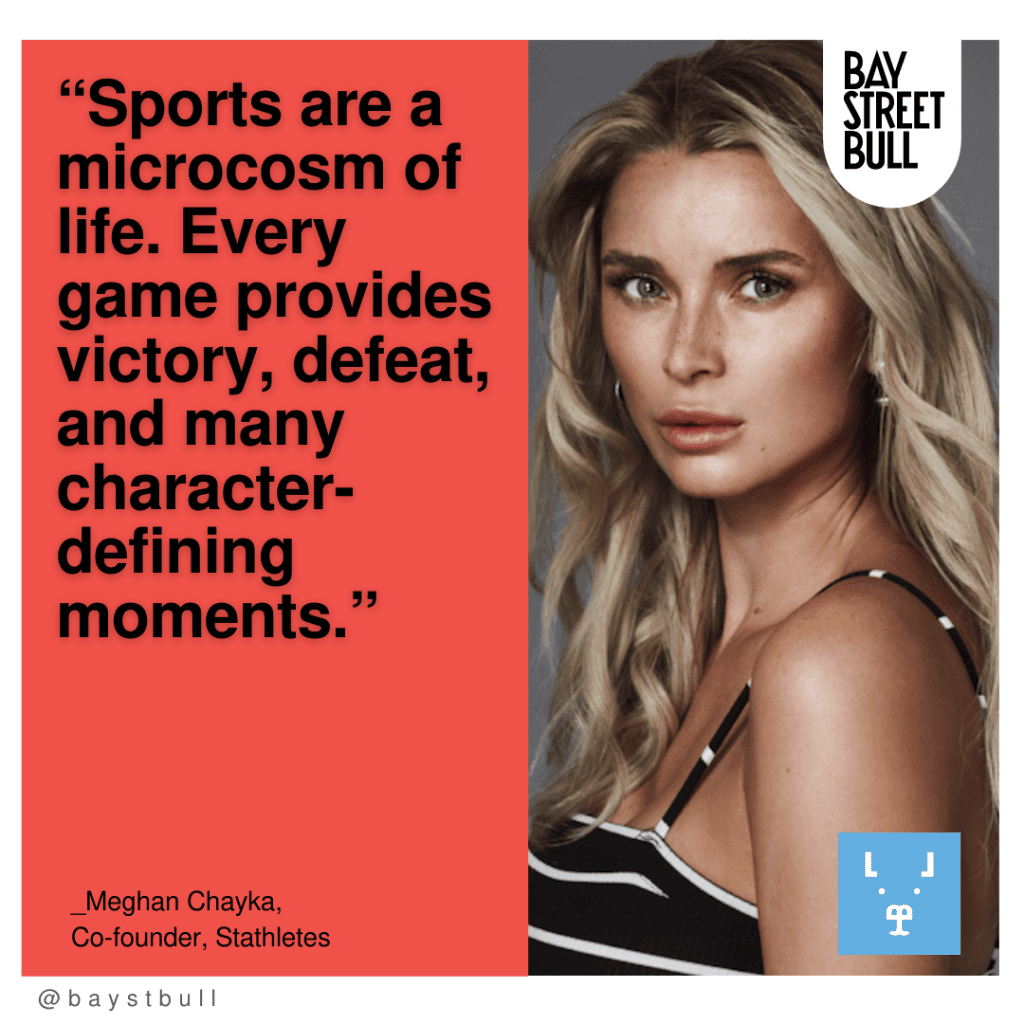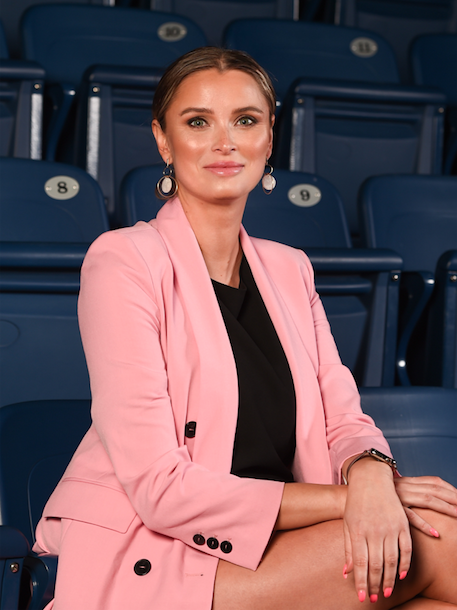Meghan Chayka has long been a champion of harnessing the power of data. While movies like Moneyball may have glamourized the application of analytics in sports, Chayka was already ahead of the game when she co-founded Stathletes in 2010 with her business partner Neil Lane. The entrepreneur shares how she built her company, the power of data and analytics, and how the sports industry can build a more inclusive and diverse workplace.
(Cover photo: Carlos & Alyse)
What is Stathletes and how does it work?
Stathletes is a sports data and analytics company focusing on hockey. We provide industry-leading data and analytic product subscriptions in North America and Europe that our clients use to gain insights into their performance, gain a competitive advantage and engage fans. Our mission is to disrupt the status quo with data in sports, specifically hockey. We want to provide insights that help teams win, leagues grow, and our clients understand the game in deeper ways.
Why did you decide to start Stathletes?
I was always interested in entrepreneurship so I focused a lot of effort in my undergrad on learning as much as possible about the field. The first start-up competition I won was for a healthy baby bottle company—a stark difference from sports technology.
We decided on Stathletes when we were in graduate school and won a business competition in Louisville, Kentucky. We funded our initial launch with the money we had won from three competitions after that in the US and Canada and saw a big opportunity in the market at the intersection of sports and data.
You harness the power of data in sports. In what ways do you think the industry can utilize data to its fullest potential?
I think data and analytics are not discussed enough. You can have great research and ideas but if it’s not acted upon within the organization, the power of it is lost. There needs to be buy-in from different departments and an understanding of how this information is passed along to key stakeholders.
RELATED: How an Ontario Native Became the Youngest GM In NHL History
Was it difficult to get people on board with your mission at the start?
It’s taken time in hockey as it’s a fairly traditional market. With the Moneyball movie, more people understood there was potential in sports for data and analytics. I think there’s always hesitation to be a first mover. It took organizations with money and resources to lead the way with Stathletes. Now, I think if you’re not incorporating it into your organizations, you’re behind.
You’ve witnessed great leadership in sports from both the athlete and the management side. What do you think defines a great leader?
I feel very fortunate to work in the sports technology space as I have learned a lot of leadership lessons. Sports is a microcosm of life. Every game provides victory, defeat, and many character-defining moments. Looking up to some of the more heroic performances—Mario Lemieux coming back from cancer, Michael Jordan’s flu game, Brett Favre playing right after his father passing—sports unites us all in the players and teams we are cheering for.


I think a great leader leads by example. It’s not when the lights are on and the big game is going that matters. It’s the everyday dedication to building a team, company, and culture to make others successful around you. In business and team sports, you cannot win with one person—investing time wisely in your entire team is key. I think being a positive person and having a culture that [embraces failure] allows the team to push boundaries. It’s ok to fail when you learn and can leverage those lessons to build better products.
It is well documented that diversity in an organization contributes to better overall performance. What changes have you noticed when it comes to women in decision-making roles within the sports community?
Sports has seen more women in both management and field roles as coaches and referees in the past few years. This progress has been a huge leap forward and can pave the way to very different looking leagues in five to ten years. Many leagues have put together diversity programs that I think are helping to create more space in different departments. I’m hopeful that there will be positive metrics out of these initiatives. If not, I would hope to see league policy decisions to change the ratio of women.
RELATED: Make Way for Leah MacNab, NBA Canada’s New Managing Director
Which organizations have done a good job of including women in leadership and decision-making roles?
The Toronto Raptors are one of the best examples in sports for having women in leadership positions. They not only lead in terms of diversity, but they are currently NBA champions. Masai Ujiri, President of the Raptors, says “he’s damn proud” to have 14 women work for them. I’m proud they’re in Toronto. It certainly sets the tone by incorporating more diversity and women in a winning organization. I hope other teams take note.


What are some major changes that the industry needs to make in order to keep moving forward?
I think more women need to be promoted to leadership positions to see change. I don’t buy into the pipeline problem. I know there are many well-educated, experienced women that are passed over at every level in business. I also think you have to have recruitment and HR practices that cast a wider net than the traditional hires. We see women, especially BIPOC women, not included in many job searches. I know it’s not an easy problem to answer but there are great people that are far more educated than me in this area who are working on it.
Has the quarantine provided you any new insight or time to reflect on how the sports community can embrace technology?
The COVID-19 period has given the sports space a time to reflect. We have a lot of demand from many clients wanting to put more time and effort into understanding how to leverage analytics. The time off from live sports has provided them a runway to focus more on analytics and how they can win from these new data sets.
My team at Stathletes also worked on a PPE dashboard for a group of epidemiologists and infectious disease doctors in Toronto. So, we realized that our skillsets really do transcend sports, too. It felt great to work on a project that is helping hospitals and policymakers manage PPE supplies.
RELATED: How BlueDot Founder Dr. Kamran Khan Used AI to Detect COVID-19
What is the best advice that you would give to other founders?
Enjoy the journey and trust the process. I didn’t realize that some stages were incredibly fun when building a company until they had passed. If you go in with the mindset of making the best of every situation, you will never be disappointed. There are always new opportunities. Failure is never an end for me, it’s only the beginning of a new idea.













